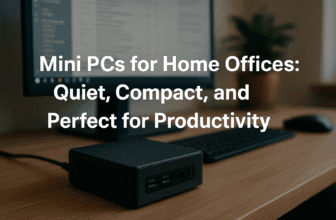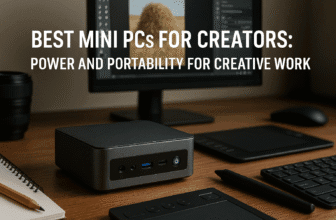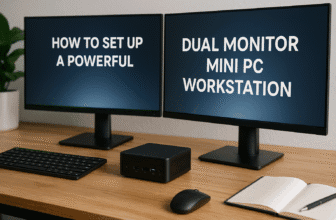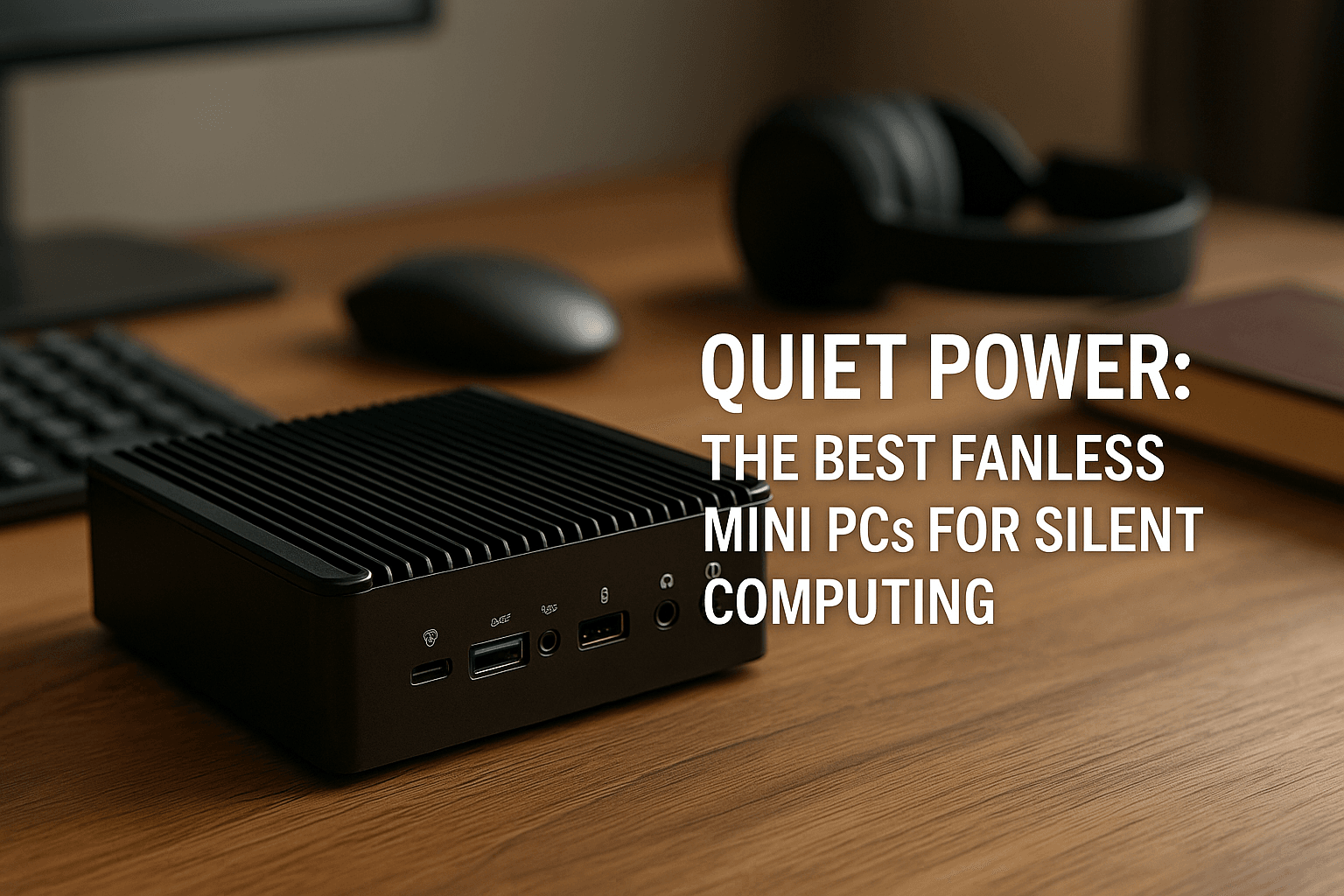
Introduction: Why Silence Matters in Modern Computing
In an age where performance meets minimalism, many users are seeking more than just power from their machines—they’re seeking peace and quiet. Fanless mini PCs have emerged as the perfect solution for those who want reliable, efficient, and completely silent computing experiences.
Whether you’re building a distraction-free home office, setting up a 24/7 media server, or deploying a system in a noise-sensitive environment like a recording studio or library, fanless mini PCs offer whisper-quiet operation without compromising functionality.
This guide explores the top benefits, use cases, considerations, and top-performing fanless mini PCs that deliver reliable performance in total silence.
1. What Is a Fanless Mini PC?
Fanless mini PCs are compact computers designed to operate without active cooling. Instead of using fans to dissipate heat, they rely on passive cooling—typically through heatsinks, thermal conductive cases, and efficient system design.
Key Characteristics:
- No moving parts = zero noise
- Passive cooling system = heat is distributed across aluminum or metal enclosures
- Low power draw = energy-efficient components optimized for silent operation
Fanless PCs are ideal for environments where noise is a distraction or where long uptime and minimal maintenance are required.
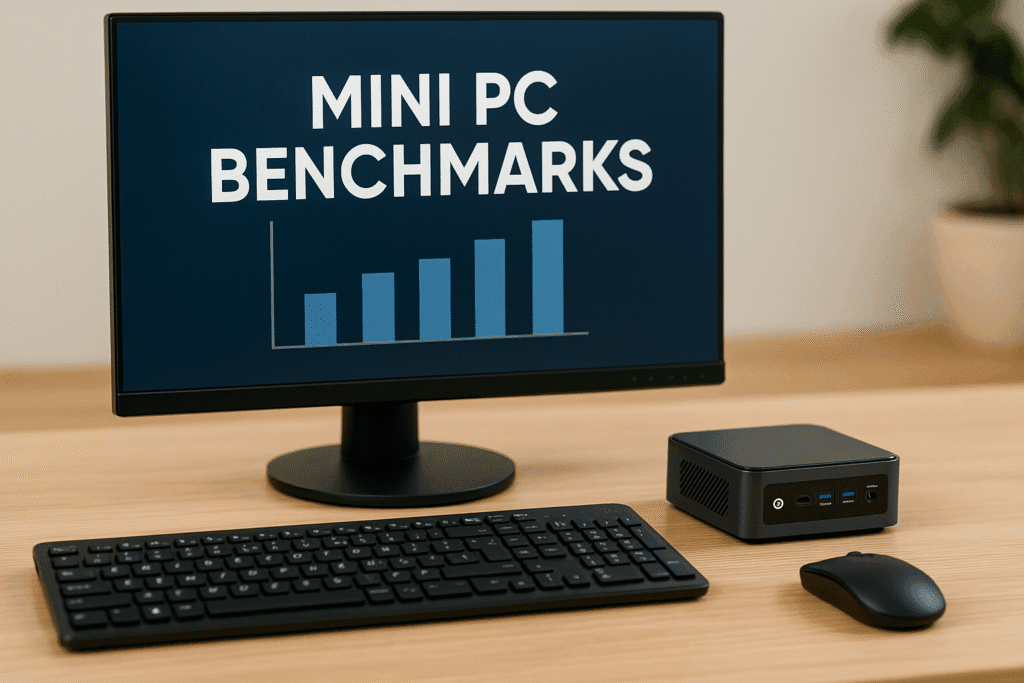
2. Why Choose a Fanless Mini PC?
✅ Silent Operation
Perfect for environments where noise matters—like home offices, audio recording studios, classrooms, and medical labs.
✅ Dust-Free and Maintenance-Free
Without fans pulling in air, there’s no internal dust buildup. This significantly reduces maintenance over time and prolongs hardware life.
✅ Energy Efficiency
Fanless mini PCs consume far less power than traditional desktops or laptops, making them an eco-friendly and cost-effective choice for long-term use.
✅ Compact and Versatile
With sizes small enough to mount behind monitors or fit on a bookshelf, they’re ideal for space-conscious setups.
3. Use Cases for Fanless Mini PCs
Home Office & Remote Work
- Zero noise during calls or concentration-heavy tasks
- Run productivity apps, browsers, and lightweight tools with ease
Media Centers & HTPCs
- Stream 4K video or host a Plex server without fan noise interrupting playback
- Fits easily into entertainment cabinets or mounted behind a TV
Digital Signage
- Perfect for 24/7 signage displays in lobbies, shops, or schools
- Reliable, dust-resistant design for harsh environments
Embedded Systems
- Power smart kiosks, industrial monitors, or IoT systems with minimal power draw and maximum uptime
Development Servers or Linux Boxes
- Run local servers, NAS units, or custom Linux environments without constant whirring sounds
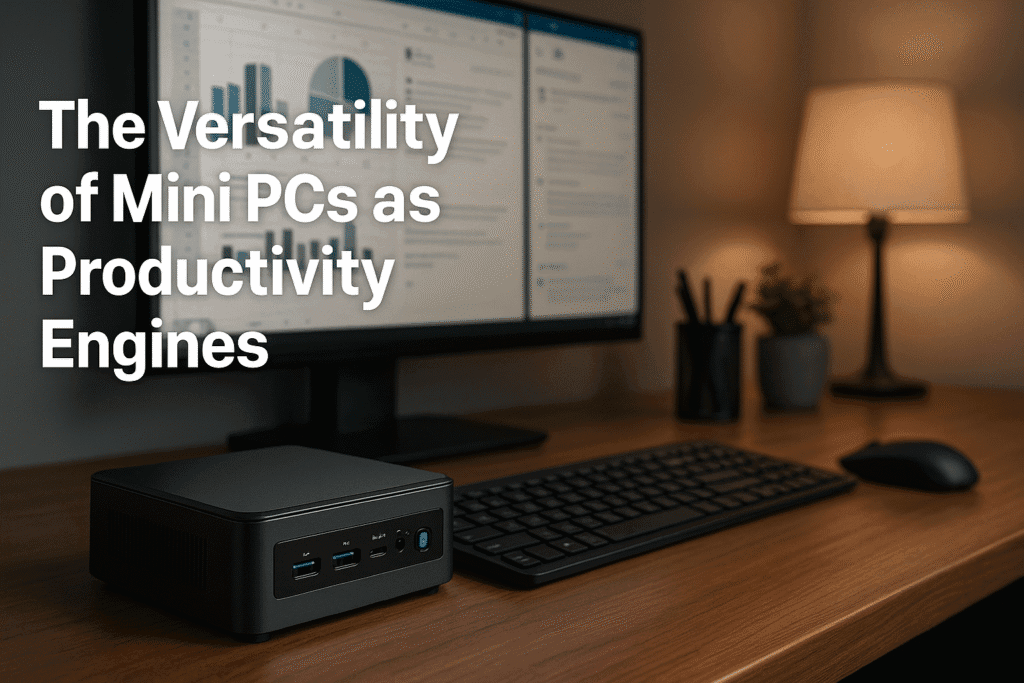
4. Things to Consider Before Buying a Fanless Mini PC
🔧 Performance Expectations
Most fanless models are not built for heavy 3D gaming or intensive rendering. They’re optimized for low- to mid-range tasks.
🔌 Thermal Design and Enclosure
Look for units with premium metal housings and external heat sinks. Aluminum chassis offer better heat dissipation than plastic ones.
🔋 Power Consumption
Fanless units are incredibly efficient—some drawing as little as 6–15 watts. This makes them great for solar setups, off-grid installations, or eco-conscious users.
🖥️ Connectivity Options
Don’t trade silence for functionality. Look for:
- Dual monitor support
- USB 3.2/USB-C ports
- Ethernet, Wi-Fi 6, and Bluetooth 5.2+
- Internal or external antenna options
5. Top Fanless Mini PCs on the Market
These models are known for offering a balance of silent operation, performance, and compact design:
🔹 Zotac ZBOX CI622 nano
- CPU: Intel Core i7-1255U
- RAM: Up to 64GB DDR4
- Storage: 1x M.2 SSD + 1x 2.5″ SATA
- Features: Dual Gigabit LAN, HDMI + DisplayPort, Wi-Fi 6 ready
A great all-around performer for workstations or light media servers.
🔹 MeLE Quieter3Q Fanless Mini PC
- CPU: Intel Celeron N5105
- RAM: 8GB LPDDR4
- Storage: 128GB eMMC + M.2 SSD slot
- Features: Dual HDMI, USB 3.0, compact enough for VESA mounting
Best for basic tasks, digital signage, or web browsing. Budget-friendly and ultra-compact.
🔹 Fitlet3 by Compulab
- CPU: AMD Ryzen Embedded R1606G
- RAM: Up to 32GB
- Storage: Multiple SSD configurations
- Features: Designed for industrial and embedded use with rugged casing
Ideal for 24/7 edge computing, smart displays, or environmental monitoring.
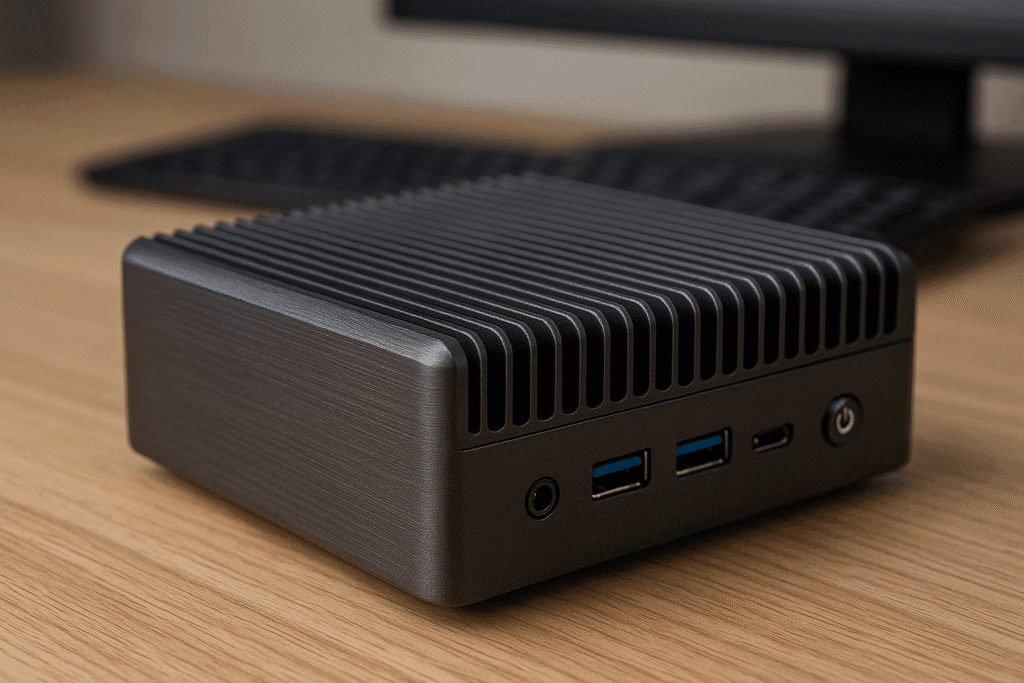
🔹 Intel NUC 11 Essential (Fanless Version by Akasa Turing)
- CPU: Intel Pentium Silver
- RAM: Upgradable
- Storage: M.2 NVMe SSD
- Features: Comes with a passively cooled Akasa case for zero noise
An entry-level PC wrapped in a premium passive-cooled enclosure.
🔹 Turing A50 (Akasa Case + Ryzen APU)
- CPU: AMD Ryzen 5 5600G (custom builds)
- Cooling: Premium fanless case with full passive cooling
- Customization: Supports full-size RAM and NVMe storage
For enthusiasts looking to build their own silent system with more horsepower.
6. Fanless vs. Traditional Mini PCs
| Feature | Fanless Mini PC | Traditional Mini PC |
|---|---|---|
| Noise | Completely silent | Audible, especially under load |
| Cooling | Passive (no fans) | Active (internal fans) |
| Maintenance | Minimal (dust-free) | Requires occasional cleaning |
| Performance Ceiling | Moderate | Higher potential (with better cooling) |
| Best For | Quiet environments, light-medium tasks | Demanding creative or gaming tasks |
While fanless models are ideal for silent and low-power applications, those needing more raw GPU or CPU power should consider actively cooled options.
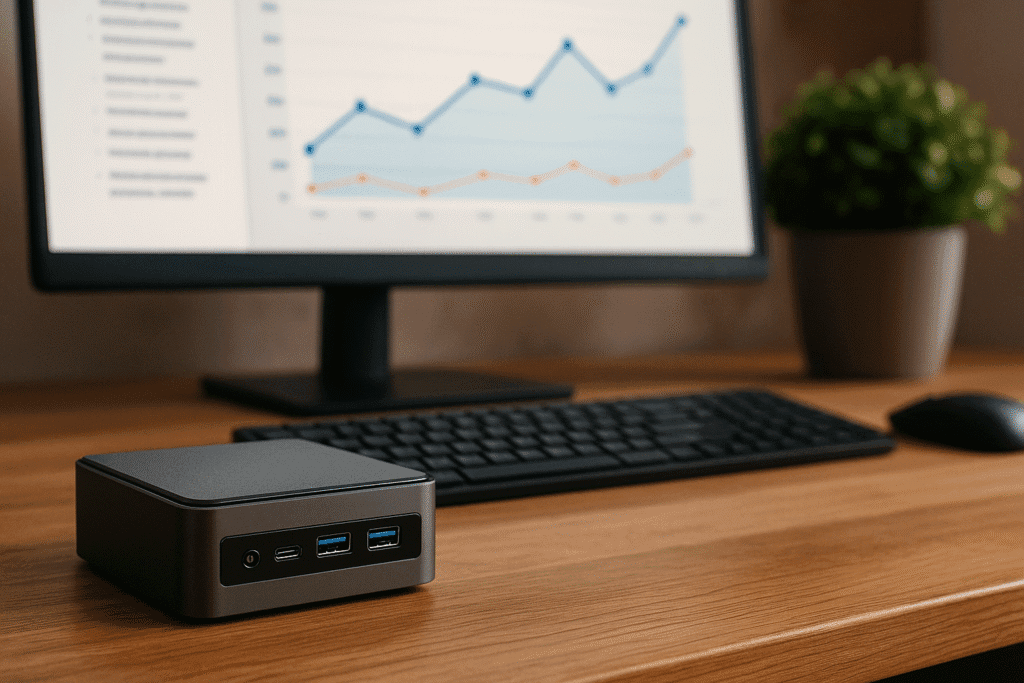
7. Tips for Optimizing a Fanless Mini PC Setup
- Place in an open area: Avoid enclosing the PC in tight spaces; ventilation matters even without fans.
- Keep ambient temperature moderate: Passive cooling works best in cooler environments.
- Avoid overclocking or pushing CPU to 100% for long durations.
- Use SSDs over HDDs: Not only are SSDs faster, they’re also quieter and generate less heat.
- Regularly update BIOS and firmware for thermal optimization and security patches.
8. Quiet Productivity: Who Needs a Fanless Mini PC Most?
✔️ Writers, remote workers, or editors who demand zero background noise during focus sessions.
✔️ IT admins who want reliable, unattended systems running 24/7.
✔️ Musicians and podcasters who need to record without fan interference.
✔️ Retail and commercial spaces that require sleek, tamper-resistant signage or display devices.
✔️ Educational institutions that benefit from low-maintenance, durable student devices.
9. How Much Should You Spend on a Fanless Mini PC?
| Budget Range | What You Can Expect |
|---|---|
| Under $300 | Celeron-based systems for browsing and signage |
| $300–$600 | Dual-core or quad-core CPUs, decent I/O, 8–16GB RAM |
| $600–$900+ | Ryzen Embedded or i5/i7-class CPUs, SSD storage, dual 4K display support |
| $1000+ | Ruggedized or industrial-grade systems, highly customizable silent builds |
Final Thoughts: Silent Power, Maximum Simplicity
Fanless mini PCs are proof that less can indeed be more. They offer quiet reliability, sleek designs, and energy savings—without requiring performance sacrifices for most day-to-day needs. From minimalist home offices to digital signage displays and embedded solutions, these silent machines are changing how we think about desktop computing.
By choosing a fanless mini PC that matches your workload and space, you’re investing in not only performance—but peace and focus too.
👉 Call to Action: Ready to build a quieter, cleaner, and more efficient computing experience? Explore today’s best fanless mini PCs and discover the power of silence.

I am a USMC Veteran who worked with a Lot of computers and Technology while I was in. I became hooked and learned a lot in my 20 years.
At my store, I am passionate about bringing you the latest tech products that enhance your everyday life. Our mission is to provide quality, innovation, and value, making sure you find the perfect gadgets to fit your needs. Thanks for Your Support.. Larry Mac

